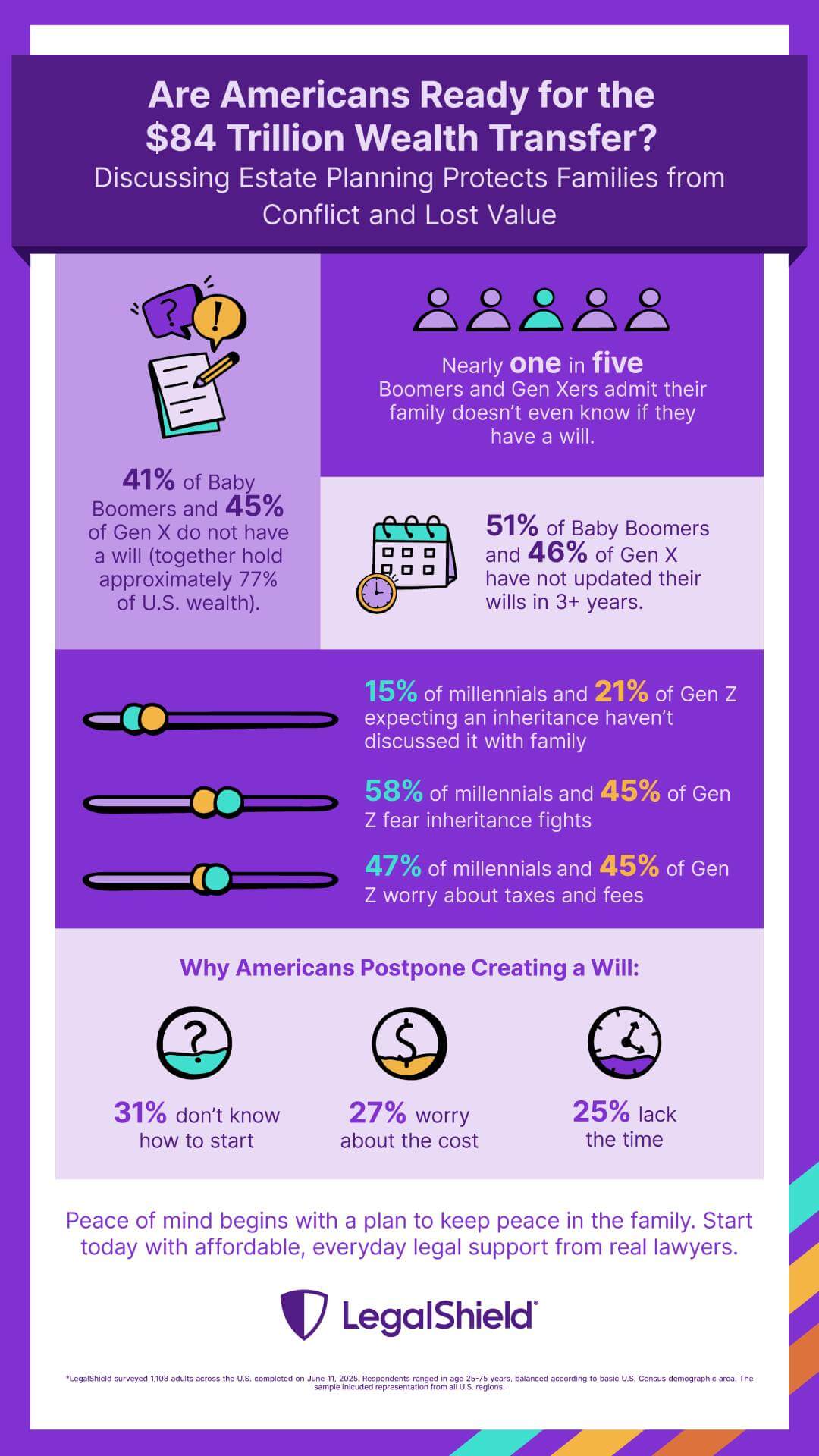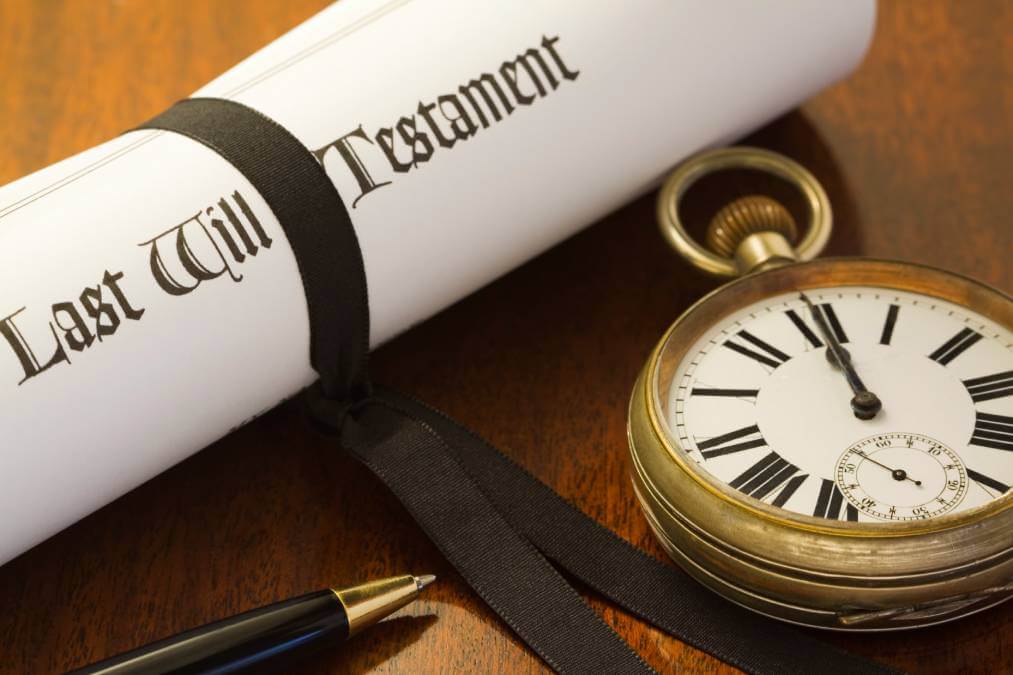Economic Uncertainty Becomes Motivator to Create Estate Plans

Key takeaway: While 96% of Americans know estate planning is important, only 56% have Wills—but economic uncertainty is changing that. With 73% expecting recession and $84 trillion transferring to heirs, families are finally connecting financial anxiety to estate planning urgency, creating an unexpected opportunity for better legacy protection.
Taking control of legacy planning
If you've been putting off creating a Will or updating your estate plan, you're definitely not alone. Our recent survey of over 1,000 Americans revealed something fascinating: nearly everyone (96%) recognizes estate planning as critically important, yet only 56% have actually taken action to create a Will.
But here's what's really interesting—and honestly, encouraging—about our current moment: economic uncertainty is finally changing that pattern. With 73% of Americans expecting a recession to impact their financial security and the largest wealth transfer in history already underway, families are making a crucial connection between protecting what they've built and preparing for an uncertain future.
After years of procrastination, economic anxiety is proving to be exactly the catalyst many families needed to finally tackle estate planning. And that's actually great news for everyone involved.

The $84 trillion reality check that's changing everything
America is living through what economists call the "Great Wealth Transfer"—an unprecedented movement of $84 trillion from older generations to their heirs over the next two decades. This isn't just about billionaire families making headlines; it's affecting families across all income levels as parents who built wealth during decades of economic growth prepare to pass assets to their children and grandchildren.
But here's where the story gets complicated, and frankly, a little concerning: nearly half (46%) of Americans expect to receive an inheritance, yet only 38% actually know the details of their parents' estate plans. Meanwhile, 43% of existing Wills haven't been updated in three or more years, potentially missing major life changes, new assets, or updated family dynamics.
"We're watching families wake up to a reality they can no longer ignore," says Warren Schlichting, CEO of LegalShield. "The Great Wealth Transfer isn't waiting for perfect economic conditions. It's happening now, during a time of significant uncertainty, which makes proper planning more crucial than ever."

What makes this wealth transfer different
This isn't your grandparents' inheritance situation. Today's wealth transfer includes:
Digital assets that didn't exist before:
- Cryptocurrency and digital wallets
- Online business interests and domain names
- Social media accounts
- Digital creative works and intellectual property
Complex modern portfolios:
- Multiple retirement accounts across different employers
- Investment apps and robo-advisor accounts
- Stock options and equity compensation
- Real estate in multiple states
Nearly two-thirds of Americans now have digital assets they want preserved and accessible to loved ones, yet most existing estate plans were created before these assets existed, leaving families with significant blind spots.
Why economic anxiety might be the best thing for your estate plan
It might seem counterintuitive, but economic uncertainty could be exactly what your family needs to finally get serious about estate planning. More than 60% of survey respondents said current economic conditions make estate planning feel more urgent—and they're absolutely right to feel that way.
Think about it: when markets are volatile and recession fears are high, protecting what you've already accumulated becomes just as important as building wealth. A well-structured estate plan acts like financial insurance, ensuring your assets go where you want them to go, regardless of what happens to the broader economy.
"Economic pressure often provides the clarity families need," explains Wayne Hassay, a LegalShield provider attorney and managing partner of Maguire Schneider Hassay, LLP. "When people are worried about their financial future, they suddenly understand that protecting their legacy isn't optional—it's essential. That mindset shift is incredibly powerful."
How economic uncertainty creates estate planning opportunities
- Market volatility highlights asset protection needs: Families realize that wealth can disappear quickly without proper planning
- Recession fears prompt family conversations: Economic stress makes inheritance discussions feel more urgent and practical
- Tax uncertainty drives action: Potential changes to estate tax laws make current planning more valuable
- Inflation concerns motivate wealth preservation: Families want to ensure purchasing power transfers to heirs
Economic uncertainty also helps families have conversations they might otherwise avoid. Discussions about inheritance, end-of-life care, and financial priorities become easier when everyone understands that economic conditions could change quickly.
The three big barriers that keep families stuck (and how to break through them)
Despite widespread recognition that estate planning matters, our survey identified three main obstacles preventing families from taking action. The good news? Each one is more manageable than most people think.
Barrier #1: Not knowing where to start (31% of families)
The fear: Estate planning feels overwhelming when you don't know what documents you need or what decisions to make.
The reality: A qualified attorney can walk you through the entire process, starting with your specific situation and goals.
First steps you can take today:
- Create a simple asset inventory (bank accounts, retirement funds, property, etc.)
- Think about who you'd want making decisions if you couldn't
- Consider what matters most for your family's future
"The barrier of not knowing where to start often dissolves the moment families sit down with an experienced attorney," Hassay notes. "What seemed overwhelming becomes a structured conversation about your specific goals and circumstances."
Barrier #2: Worrying about costs (27% of families)
The fear: Many people assume estate planning is expensive and only for wealthy families.
The reality: The cost of not having a plan far exceeds the investment in creating one.
Cost perspective:
- Basic estate planning: $300-1,500
- Probate proceedings: Often $3,000-10,000+
- Family legal battles: Can reach tens of thousands
- Tax inefficiencies: Potentially hundreds of thousands for larger estates
Modern solutions: Services like LegalShield make professional estate planning accessible to middle-income families who previously couldn't afford traditional attorney fees.
Barrier #3: Feeling like there's no time (25% of families)
The fear: Between work, family, and daily responsibilities, estate planning gets pushed to "someday."
The reality: Creating a basic estate plan doesn't require months of your time—most families can get essential documents in place with just a few focused conversations with an attorney.
Time investment breakdown:
- Initial consultation: 1-2 hours
- Document review and signing: 1-2 hours
- Total timeline: 2-4 weeks for most families
"The barriers that prevent families from estate planning are often more perception than reality," Schlichting observes. "When you work with an experienced attorney who can guide you through the process step by step, what seemed overwhelming becomes manageable, what seemed expensive becomes affordable, and what seemed time-consuming becomes efficient."

Why professional guidance matters more than ever in 2025
In an era of DIY everything, you might wonder if you can handle estate planning yourself. Our survey suggests most Americans are skeptical of that approach—53% worry about the legal validity of AI-generated Wills.
There's good reason for that skepticism. Estate planning laws vary significantly by state, family situations are unique, and the consequences of mistakes can be severe. A Will that's technically valid but poorly structured could still lead to family conflicts, tax problems, or unintended outcomes.
What professional estate planning really provides
- Legal expertise: Understanding of state-specific laws and requirements
- Strategic thinking: How to structure plans for tax efficiency and family harmony
- Scenario planning: Anticipating problems and creating solutions
- Modern asset integration: Properly handling digital assets and complex investments
- Ongoing relationships: Support for updates as life circumstances change
Professional estate planning also means having someone who understands how current economic conditions might affect your planning strategies. For example, market volatility might influence how you structure trusts, recession fears might change your charitable giving timeline, or concerns about future tax policy might affect when you transfer assets.
"Every family's situation is different, and cookie-cutter solutions rarely work," Hassay explains. "An experienced estate planning attorney doesn't just help you create documents—they help you think through scenarios, anticipate problems, and structure your plan to achieve your specific goals."

Essential estate planning documents everyone needs
The core four documents
1. Last Will and Testament
- Directs how your estate assets get distributed
- Names guardians for minor children
- Appoints an executor to manage your estate
- Provides instructions for personal belongings
2. Financial Power of Attorney
- Authorizes someone to handle finances if you're incapacitated
- Prevents the need for court-appointed conservatorship
- Can be immediate or "springing" (activated upon incapacity)
3. Healthcare Directive (Living Will)
- Documents your medical treatme
nt preferences - Reduces family stress during medical emergencies
- Ensures your wishes are followed when you can't communicate
4. Healthcare Power of Attorney
- Appoints someone to make medical decisions on your behalf
- Works alongside your healthcare directive
- Essential for complex medical situations

Advanced planning for complex situations
For larger estates, business owners, or to avoid probate:
- Revocable living trusts
- Business succession planning
- Tax minimization strategies
- Charitable giving structures
For families with specific needs:
- Special needs trusts
- Education funding provisions
- Multi-generational planning
- Digital asset management
The silver lining of uncertain times
While economic uncertainty creates stress, it's also creating an unprecedented opportunity for families to get their affairs in order. Families who use this moment of heightened financial awareness to create comprehensive estate plans Will be positioned to preserve their legacy regardless of what economic conditions may bring.
The current environment is also prompting important family conversations that might not happen during more stable times. When parents and adult children are both thinking about financial security, it becomes easier to discuss inheritance expectations, care preferences, and family values around money.
Why now is actually the perfect time
- Motivated mindset: Economic concerns create urgency that overcomes procrastination
- Family awareness: Everyone is thinking about financial security simultaneously
- Professional availability: Estate planning attorneys are ready to help families take action
- Tax considerations: Current laws provide planning opportunities that may not exist later
- Technology integration: Modern estate planning can properly address digital assets
"This convergence of the wealth transfer and economic awareness represents a unique opportunity," Schlichting concludes. "Families who take advantage of this motivation to create solid estate plans Will thank themselves later—not just for the financial protection, but for the peace of mind that comes from knowing they're prepared for whatever comes next."
Taking your first step forward
If economic uncertainty has you thinking more seriously about estate planning, that's actually a positive development. The key is channeling that awareness into action while the motivation is strong.

Why LegalShield makes estate planning accessible
For many families, the biggest barrier to estate planning isn't recognizing its importance—it's finding affordable, professional help. LegalShield members have access to licensed estate planning attorneys who provide comprehensive services at a fraction of traditional costs.
LegalShield estate planning benefits:
- Consultation with licensed attorneys with an average of 22 years of professional experience
- Document preparation and review (see a legal plan for specific documents included and those provided at a discounted rate)
- Ongoing updates as life changes
- Family education and support
- Affordable monthly membership structure
“Don't let the perfect be the enemy of the good. A well-crafted estate plan that addresses your current situation is infinitely better than no plan at all,” encourages Hassay. “You can always update and refine your planning as circumstances change.”
Economic uncertainty may be uncomfortable, but it's proving to be exactly the motivation many families needed to finally protect what matters most. The question isn't whether you can afford to create an estate plan—it's whether you can afford not to.
Frequently asked questions
Q: How much does estate planning cost?
A: Basic estate planning typically costs $300-1,500, while complex plans may cost more. However, the cost of not having a plan (probate, family disputes, taxes) often exceeds planning costs significantly.
Q: How long does estate planning take?
A: Simple plans can be completed in 2-4 weeks, while complex situations may take 6-8 weeks. The key is starting the process rather than waiting for perfect timing.
Q: Do I need estate planning if I'm young?
A: Yes. Anyone with assets, dependents, or strong preferences about medical care should have basic estate planning documents.
Q: Can I update my estate plan myself?
A: While minor updates may be possible, significant changes should involve an attorney to ensure legal validity and proper implementation.
Q: What happens if I die without a Will?
A: State intestacy laws determine asset distribution, which may not align with your wishes and can create family conflicts and additional costs.
_________________________________________________________________________
Written by Elyse Dillard, Content Specialist at LegalShield. Elyse creates educational resources about legal and identity theft protection services. She works to make complex legal concepts more accessible to readers and has contributed to numerous articles on the LegalShield blog.
Paid Legal Services, Inc. (“PPLSI”) provides this blog as a public service and for general information only. The information made available in this blog is meant to provide general information and is not intended to provide legal advice, render an opinion, or provide a recommendation as to a specific matter. The blog post is not a substitute for competent legal counsel from a licensed professional lawyer in the state or province where your legal issues exist, and you should seek legal counsel for your specific legal matter. All information by authors is accepted in good faith. However, PPLSI makes no representation or warranty of any kind, express or implied, regarding the accuracy, adequacy, validity, reliability, availability, or completeness of such information. The materials contained herein are not regularly updated and may not reflect the most current legal information. No person should either act or refrain from acting on the basis of anything contained on this website. Nothing on this blog is meant to, or does, create an attorney-client relationship with any reader or user. An attorney-client relationship may be formed only after the execution of an engagement letter with an attorney and after that attorney has confirmed that no conflicts of interest exist. Nothing on this website, or information contained or transmitted by this website, is intended to be an advertisement or solicitation. Information contained in the blog may be provided by authors who could be a third-party paid contributor.
PPLSI provides access to legal services offered by a network of provider law firms to PPLSI members through membership-based participation. Neither PPLSI is not a law firm, and its officers, employees or sales associates do not directly or indirectly provide legal services, representation, or advice.
Ready to protect your family's future?
Economic uncertainty makes estate planning more important than ever. LegalShield members have access to licensed estate planning attorneys who can guide you through the entire process. Learn more about LegalShield's estate planning services.
LegalShield is a trademark of Pre-Paid Legal Services, Inc. (“LegalShield”). LegalShield provides this blog as a public service and for general information only. The information made available in this blog is meant to provide general information and is not intended to provide legal advice, render an opinion, or provide a recommendation as to a specific matter. The blog post is not a substitute for competent legal counsel from a licensed professional lawyer in the state or province where your legal issues exist, and you should seek legal counsel for your specific legal matter. All information by authors is accepted in good faith. However, LegalShield makes no representation or warranty of any kind, express or implied, regarding the accuracy, adequacy, validity, reliability, availability, or completeness of such information. The materials contained herein are not regularly updated and may not reflect the most current legal information. No person should either act or refrain from acting on the basis of anything contained on this website. Nothing on this blog is meant to, or does, create an attorney-client relationship with any reader or user. An attorney-client relationship may be formed only after the execution of an engagement letter with an attorney and after that attorney has confirmed that no conflicts of interest exist. Nothing on this website, or information contained or transmitted by this website, is intended to be an advertisement or solicitation. Information contained in the blog may be provided by authors who could be a third-party paid contributor. LegalShield provides access to legal services offered by a network of provider law firms to LegalShield members through membership-based participation. LegalShield is not a law firm, and its officers, employees or sales associates do not directly or indirectly provide legal services, representation, or advice.



